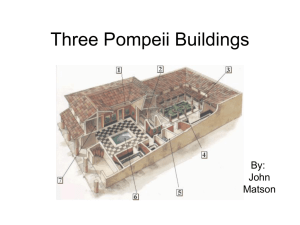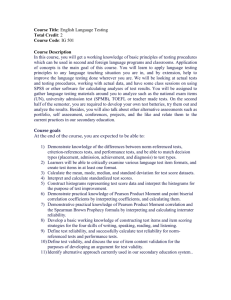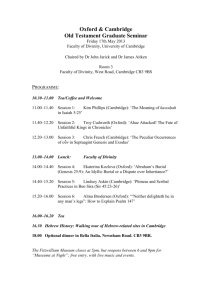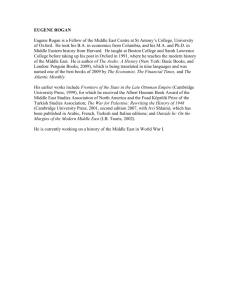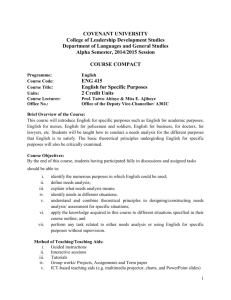Sallust and the Outsiders: The Role of Audiences in the Histories1
advertisement
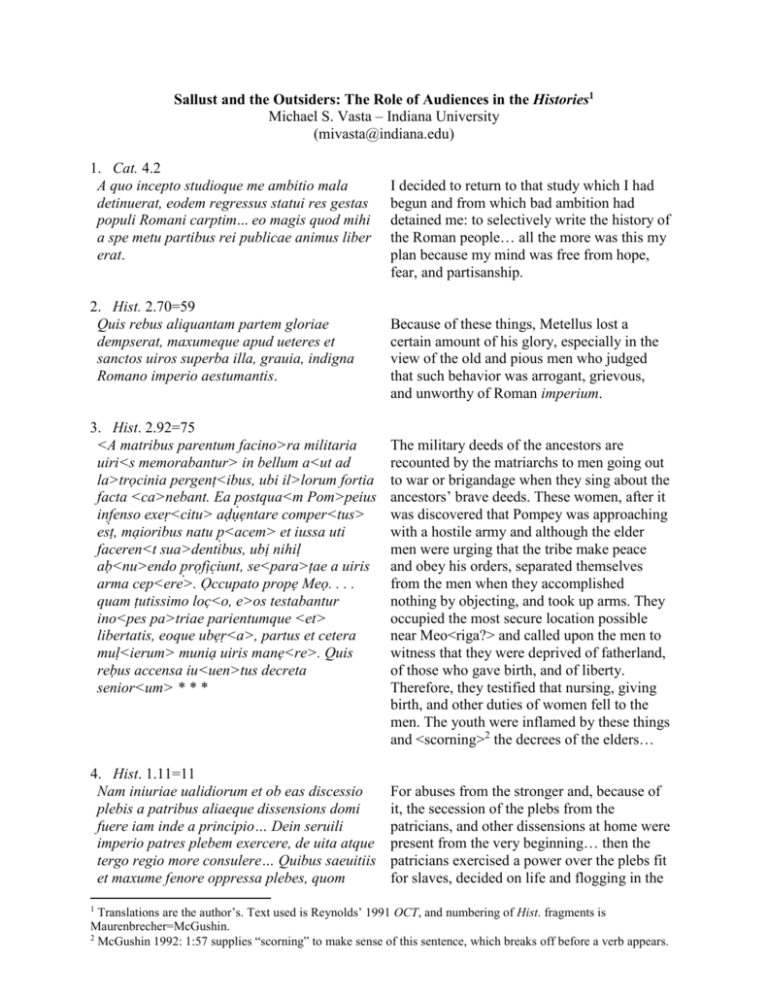
Sallust and the Outsiders: The Role of Audiences in the Histories1 Michael S. Vasta – Indiana University (mivasta@indiana.edu) 1. Cat. 4.2 A quo incepto studioque me ambitio mala detinuerat, eodem regressus statui res gestas populi Romani carptim... eo magis quod mihi a spe metu partibus rei publicae animus liber erat. 2. Hist. 2.70=59 Quis rebus aliquantam partem gloriae dempserat, maxumeque apud ueteres et sanctos uiros superba illa, grauia, indigna Romano imperio aestumantis. 3. Hist. 2.92=75 <A matribus parentum facino>ra militaria uiri<s memorabantur> in bellum a<ut ad la>trọcinia pergenṭ<ibus, ubi il>lorum fortia facta <ca>nebant. Ea postqua<m Pom>peius ̣ infenso exeṛ<citu> aḍụẹntare comper<tus> ̣ esṭ, mạioribus natu p<acem> et iussa uti ̣ faceren<t sua>dentibus, ubị nihiḷ aḅ<nu>endo prọfịc ̣iunt, se<para>ṭae a uiris ̣ arma cep<ere>. Ọccupato propẹ Meọ. . . . quam ṭutissimo loc ̣<o, e>os testabantur ino<pes pa>triae parientumque <et> libertatis, eoque ubẹṛ<a>, partus et cetera muḷ<ierum> muniạ uiris manẹ<re>. Quis reḅus accensa iu<uen>tus decreta senior<um> * * * 4. Hist. 1.11=11 Nam iniuriae ualidiorum et ob eas discessio plebis a patribus aliaeque dissensions domi fuere iam inde a principio… Dein seruili imperio patres plebem exercere, de uita atque tergo regio more consulere… Quibus saeuitiis et maxume fenore oppressa plebes, quom I decided to return to that study which I had begun and from which bad ambition had detained me: to selectively write the history of the Roman people… all the more was this my plan because my mind was free from hope, fear, and partisanship. Because of these things, Metellus lost a certain amount of his glory, especially in the view of the old and pious men who judged that such behavior was arrogant, grievous, and unworthy of Roman imperium. The military deeds of the ancestors are recounted by the matriarchs to men going out to war or brigandage when they sing about the ancestors’ brave deeds. These women, after it was discovered that Pompey was approaching with a hostile army and although the elder men were urging that the tribe make peace and obey his orders, separated themselves from the men when they accomplished nothing by objecting, and took up arms. They occupied the most secure location possible near Meo<riga?> and called upon the men to witness that they were deprived of fatherland, of those who gave birth, and of liberty. Therefore, they testified that nursing, giving birth, and other duties of women fell to the men. The youth were inflamed by these things and <scorning>2 the decrees of the elders… For abuses from the stronger and, because of it, the secession of the plebs from the patricians, and other dissensions at home were present from the very beginning… then the patricians exercised a power over the plebs fit for slaves, decided on life and flogging in the Translations are the author’s. Text used is Reynolds’ 1991 OCT, and numbering of Hist. fragments is Maurenbrecher=McGushin. 2 McGushin 1992: 1:57 supplies “scorning” to make sense of this sentence, which breaks off before a verb appears. 1 adsiduis bellis tributum et militiam simul toleraret, armata montem Sacrum atque Auentinum insedit tumque tribunos plebis et alia iura sibi parauit. manner of a king… Oppressed by this cruelty and especially by debt, since, due to constant warfare, they simultaneously had to endure taxes and military service, the plebs took arms and occupied the Sacred Mount and the Aventine and so obtained the tribunes of the plebs and other rights for themselves. Master/slave comparisons Oration of Memmius (Jug. 31): Oration of Lepidus (Hist. 1.55=48): Oration of Licinius Macer (Hist. 3.48=34): 11, 20, 22, 23 2, 3, 6, 25, 26 1, 9, 11, 13, 20, 26, Secession exemplum Oration of Memmius (Jug. 31): Oration of Lepidus (Hist. 1.55=48): Oration of Licinius Macer (Hist. 3.48=34): 6, 17 23 12, 15, 17 Works Cited Batstone, William W., ed. and trans. 2010. Sallust. Catiline’s Conspiracy, The Jugurthine War, Histories. Oxford World’s Classics. Oxford; New York: Oxford University Press. Chaplin, Jane D. 2000. Livy’s Exemplary History. Oxford: Oxford University Press. Dué, Casey. 2000. “Tragic History and Barbarian Speech in Sallust’s Jugurtha.” HSCP 100: 311–25. Earl, D. C. 1961. The Political Thought of Sallust. Cambridge: Cambridge University Press. Feldherr, Andrew. 2012. “Magna Mihi Copia Est Memorandi: Modes of Historiography in the Speeches of Caesar and Cato (Sallust, Bellum Catilinae 51-4).” In Time and Narrative in Ancient Historiography: The Plupast from Herodotus to Appian, ed. by Jonas Grethlein and Christopher Krebs, 95–112. Cambridge: Cambridge University Press. Flower, Harriet I. 1996. Ancestor Masks and Aristocratic Power in Roman Culture. Oxford: Clarendon Press. Gerrish, Jennifer. 2012. “Sallust’s Histories and Triumviral Historiography”. Dissertation, University of Pennsylvania. Green, C. M. C. 1993. “De Africa et Eius Incolis: The Function of Geography and Ethnography in Sallust’s History of the Jugurthine War (BJ 17-19).” AncW 24: 185–97. Kraus, Christina Shuttleworth, and A. J. Woodman. 1997. Latin Historians. Cambridge: Cambridge University Press. Maurenbrecher, Bertold, ed. 1891. C. Sallusti Crispi Historiarum Reliquiae. Leipzig: B.G. Teubner. McGushin, Patrick, ed. 1977. C. Sallustius Crispus, Bellum Catilinae: A Commentary. Leiden: Brill. ———, ed. and trans. 1992-94. Sallust. The Histories. Vol. 1-2. Oxford; New York: Oxford University Press. Morstein-Marx, Robert. 2001. “The Myth of Numidian Origins in Sallust’s African Excursus (Iugurtha 17.718.12).” AJP 122: 179–200. Paul, G. M. 1984. A Historical Commentary on Sallust’s Bellum Jugurthinum. Liverpool: F. Cairns. Roller, Matthew B. 2004. “Exemplarity in Roman Culture: The Cases of Horatius Cocles and Cloelia.” CPh 99: 1– 56. ———. 2009. “The Exemplary Past in Roman Historiography and Culture.” In The Cambridge Companion to the Roman Historians, ed. by Andrew Feldherr, 214–30. Cambridge: Cambridge University Press. Scanlon, T. F. 1980. The Influence of Thucydides on Sallust. Heidelberg: C. Winter Universitätsverlag. ———. 1988. “Textual Geography in Sallust’s The War With Jugurtha.” Ramus 17: 138–75. Vretska, Karl, ed. 1976. Sallust. De Catilinae Coniuratione. 2 vols. Heidelberg: C. Winter Universitätsverlag. Wiedemann, Thomas. 1993. “Sallust’s Jugurtha: Concord, Discord, and the Digressions.” G&R 40: 48–57.


